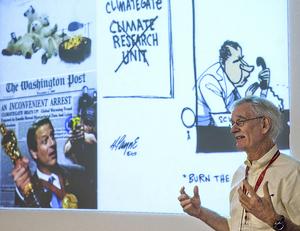 |
|
|
Stolen emails and refusals to share dataIn 2009, 13 years of private emails were stolen from the computers at the Climate Research Unit (CRU) at the University of East Anglia. The centre specialises in building computer models of the Earth's past climate. For some time before this event, the CRU had been swamped by requests for copies of all of their climate data using Freedom of Information law. The CRU avoided or refused most requests, believing them to be trouble making actions designed to slow down their work. Accusations of fraudStraight after the theft the emails were published online. Climate sceptics worldwide wrote blogs claiming the emails "proved" that the scientific consensus that climate change is happening was a fake. They selected a few sentences out of context from the thousand or so messages and concluded that they showed a conspiracy to hide flaws in the data. These blogs were picked up by the world's media and a huge scandal erupted causing Phil Jones, the head of the CRU, to temporarily resign while his work was investigated. Scientists clearedGovernment enquiries in both the UK and the USA later examined the evidence and concluded that there had been absolutely no wrong-doing on the part of the scientists and that no faking or fraud had been committed. Phil Jones was given his job back. However, the UK review also concluded that much more openness is needed in the way that scientific research is conducted. Lessons learnedTwo big issues arise from this: access to scientific data and how research is checked. Science is supposed to be scrutinised through peer review, but that is only possible if the original data is freely available.
Use the concepts listed in the ethical toolkit to help you. Do you think that those involved in "Climategate" lived up to the ethical requirements your class came up with?
|



What's your opinion?
Average rating




Not yet rated